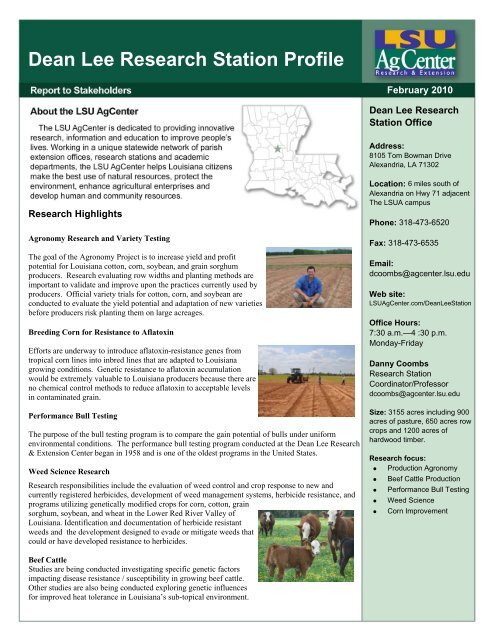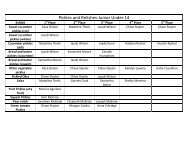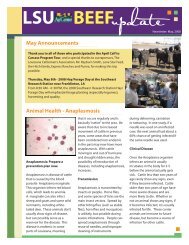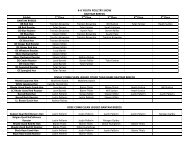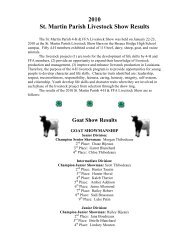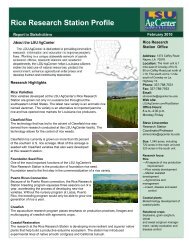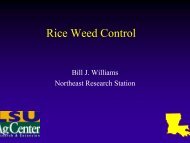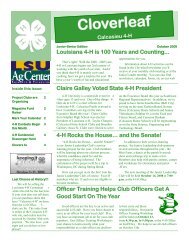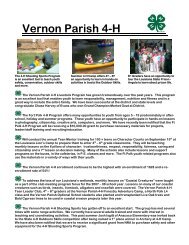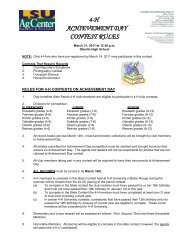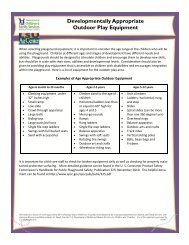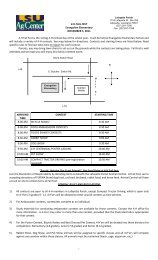Dean Lee Research Station Profile - The LSU AgCenter
Dean Lee Research Station Profile - The LSU AgCenter
Dean Lee Research Station Profile - The LSU AgCenter
You also want an ePaper? Increase the reach of your titles
YUMPU automatically turns print PDFs into web optimized ePapers that Google loves.
<strong>Dean</strong> <strong>Lee</strong> <strong>Research</strong> <strong>Station</strong> <strong>Profile</strong><br />
February 2010<br />
<strong>Dean</strong> <strong>Lee</strong> <strong>Research</strong><br />
<strong>Station</strong> Office<br />
Address:<br />
8105 Tom Bowman Drive<br />
Alexandria, LA 71302<br />
<strong>Research</strong> Highlights<br />
Agronomy <strong>Research</strong> and Variety Testing<br />
<strong>The</strong> goal of the Agronomy Project is to increase yield and profit<br />
potential for Louisiana cotton, corn, soybean, and grain sorghum<br />
producers. <strong>Research</strong> evaluating row widths and planting methods are<br />
important to validate and improve upon the practices currently used by<br />
producers. Official variety trials for cotton, corn, and soybean are<br />
conducted to evaluate the yield potential and adaptation of new varieties<br />
before producers risk planting them on large acreages.<br />
Breeding Corn for Resistance to Aflatoxin<br />
Efforts are underway to introduce aflatoxin-resistance genes from<br />
tropical corn lines into inbred lines that are adapted to Louisiana<br />
growing conditions. Genetic resistance to aflatoxin accumulation<br />
would be extremely valuable to Louisiana producers because there are<br />
no chemical control methods to reduce aflatoxin to acceptable levels<br />
in contaminated grain.<br />
Performance Bull Testing<br />
<strong>The</strong> purpose of the bull testing program is to compare the gain potential of bulls under uniform<br />
environmental conditions. <strong>The</strong> performance bull testing program conducted at the <strong>Dean</strong> <strong>Lee</strong> <strong>Research</strong><br />
& Extension Center began in 1958 and is one of the oldest programs in the United States.<br />
Weed Science <strong>Research</strong><br />
<strong>Research</strong> responsibilities include the evaluation of weed control and crop response to new and<br />
currently registered herbicides, development of weed management systems, herbicide resistance, and<br />
programs utilizing genetically modified crops for corn, cotton, grain<br />
sorghum, soybean, and wheat in the Lower Red River Valley of<br />
Louisiana. Identification and documentation of herbicide resistant<br />
weeds and the development designed to evade or mitigate weeds that<br />
could or have developed resistance to herbicides.<br />
Location: 6 miles south of<br />
Alexandria on Hwy 71 adjacent<br />
<strong>The</strong> <strong>LSU</strong>A campus<br />
Phone: 318-473-6520<br />
Fax: 318-473-6535<br />
Email:<br />
dcoombs@agcenter.lsu.edu<br />
Web site:<br />
<strong>LSU</strong><strong>AgCenter</strong>.com/<strong>Dean</strong><strong>Lee</strong><strong>Station</strong><br />
Office Hours:<br />
7:30 a.m.—4 :30 p.m.<br />
Monday-Friday<br />
Danny Coombs<br />
<strong>Research</strong> <strong>Station</strong><br />
Coordinator/Professor<br />
dcoombs@agcenter.lsu.edu<br />
Size: 3155 acres including 900<br />
acres of pasture, 650 acres row<br />
crops and 1200 acres of<br />
hardwood timber.<br />
<strong>Research</strong> focus:<br />
• Production Agronomy<br />
• Beef Cattle Production<br />
• Performance Bull Testing<br />
• Weed Science<br />
• Corn Improvement<br />
Beef Cattle<br />
Studies are being conducted investigating specific genetic factors<br />
impacting disease resistance / susceptibility in growing beef cattle.<br />
Other studies are also being conducted exploring genetic influences<br />
for improved heat tolerance in Louisiana’s sub-topical environment.
<strong>Dean</strong> <strong>Lee</strong> <strong>Research</strong> <strong>Station</strong><br />
February 2010<br />
Significance of <strong>Research</strong><br />
—<strong>Research</strong> on agronomic practices can make<br />
Louisiana producers more competitive in a global<br />
market.<br />
—Over 200 varieties were tested in the 2010<br />
soybean variety trials. <strong>The</strong>se tests provide<br />
important information to farmers for variety<br />
selection.<br />
— Over 8000 bulls owned by Louisiana beef<br />
cattle producers have been tested in two 112-day<br />
feedlot test that have been conducted since the<br />
bull Performance Testing program began.<br />
—<strong>Research</strong> findings will result in healthier, more<br />
heat-tolerant cattle being produced and ultimately<br />
increased productivity for both cow-calf and<br />
stocker production systems.<br />
2009 Industry Facts<br />
-34 million bushels of soybeans were produced<br />
on 1 million acres in Louisiana by 2,300<br />
producers with a value of $369 million dollars.<br />
-602,000 beef cattle are located on 11,500 farms/<br />
ranches in Louisiana with a total value of $365<br />
million dollars.<br />
-388,000 bales of cotton were produced by 510<br />
producers with a total value of $130 million<br />
dollars.<br />
-1,700 producers grew 82 million bushels of<br />
corn, grain sorghum and wheat on 705,000 acres<br />
with a total value of $363 million dollars.<br />
Data from the Louisiana Ag Summary<br />
Web site: <strong>LSU</strong><strong>AgCenter</strong>.com/agsummary<br />
Future Plans<br />
Agronomy <strong>Research</strong><br />
<strong>Research</strong> efforts will continue to address the changing landscape of<br />
crop production methods and techniques. <strong>The</strong> commodity markets<br />
will continue to influence Louisiana crop production and new crops<br />
and rotations, including bio fuel crops, will be researched as needed.<br />
Up-to-date research on newly released varieties will be a focus<br />
area of the program in the future. As higher-yielding varieties are<br />
continually introduced, research on their management and<br />
adaptation will be needed to optimize production and profitability<br />
for Louisiana farmers. In cotton, corn, and soybean, complex<br />
combinations of genetic technologies are now included in the<br />
seed. Management of these genetic technologies, and information<br />
such as when and where they are needed, will be an important<br />
part of variety testing in the future.<br />
Weed Science<br />
<strong>Research</strong> efforts will continue to address crop and weed response to<br />
herbicides and to develop economical and environmentally feasible<br />
weed management strategies for the betterment of crop producers in<br />
the Louisiana Lower Red River Valley.<br />
Beef Cattle<br />
<strong>Research</strong> will continue on studying various genetic considerations<br />
as well as management aspects for improved beef cattle production<br />
in central Louisiana.


